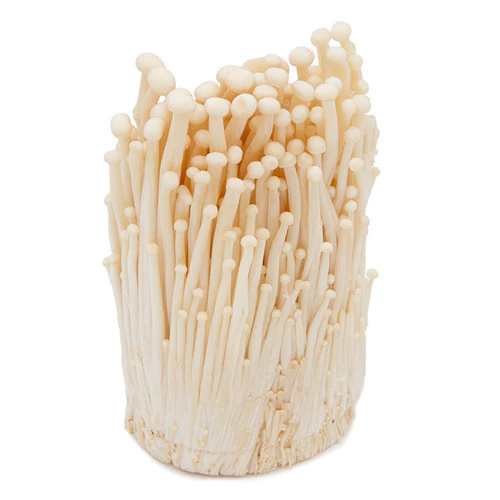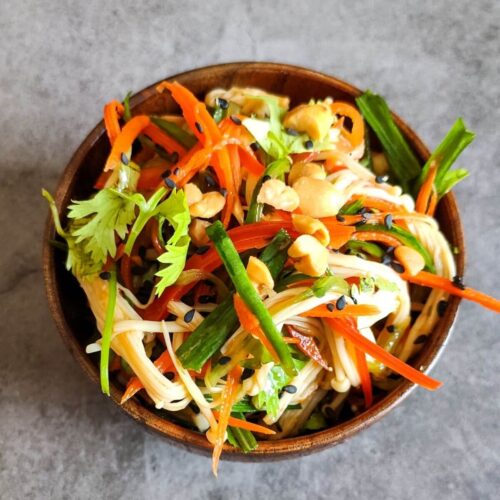The Wonder of Enoki Mushrooms
Enoki mushrooms, scientifically known as Flammulina velutipes, are a delightful and versatile ingredient that has gained popularity in cuisines around the world. These delicate and slender mushrooms, also referred to as golden needle mushrooms, offer a unique texture and a mild, slightly fruity flavor. In this article, we will delve into the fascinating world of enoki mushrooms, exploring their characteristics, health benefits, culinary uses, and more. Join us as we unravel the wonders of enoki mushrooms and discover how they can elevate your culinary endeavors.

1. Appearance and Characteristics
Enoki mushrooms are easily recognizable by their distinct appearance. They feature long, thin stems and small, white caps that form clusters. The caps have a convex shape, and as they mature, they tend to open up, exposing their delicate gills. Enoki mushrooms are known for their beautiful, ethereal appearance, resembling tiny, white flowers. Their slender stems can grow up to five inches in length, offering a delightful visual appeal to any dish.
2. Cultivation and Availability
Originally cultivated in East Asia, particularly in China, Japan, and Korea, enoki mushrooms have gained international popularity and are now grown in various parts of the world. These mushrooms are typically cultivated in controlled environments, such as indoor farms, where temperature, humidity, and lighting conditions can be carefully regulated to optimize their growth.
Enoki mushrooms are available year-round, thanks to modern cultivation techniques. However, their peak season varies depending on the region. In some areas, they are more readily available during the winter months, while in others, they can be found throughout the year in grocery stores, specialty markets, and even online.
3. Nutritional Value and Health Benefits
Enoki mushrooms not only contribute to the culinary world but also offer a range of health benefits. They are low in calories and fat, making them an excellent addition to a balanced diet. These mushrooms are also a good source of dietary fiber and contain essential nutrients, including vitamins B and D, potassium, and selenium.
Furthermore, enoki mushrooms have been associated with various health benefits. Their consumption has been linked to improved immune function, thanks to their high antioxidant content. They also contain natural compounds that possess anti-inflammatory properties, potentially aiding in the prevention of chronic diseases. Additionally, enoki mushrooms have been recognized for their potential anticancer properties and their ability to support gut health.
4. Culinary Uses
Enoki mushrooms have a delicate flavor and a crisp, slightly crunchy texture. They can be enjoyed both raw and cooked, adding a unique touch to a wide range of dishes. Here are some popular culinary uses of enoki mushrooms:
a. Soups and Broths
Enoki mushrooms are commonly used in Asian soups and broths, where they contribute their distinct flavor and a pleasant crunch. They can be added to miso soup, hot pots, and clear broths, enhancing the overall taste and visual appeal of the dish. Due to their delicate nature, enoki mushrooms require minimal cooking time to retain their texture and flavor.
b. Stir-Fries and Sauteed Dishes
Enoki mushrooms are a versatile ingredient in stir-fries and sautés. Their thin, elongated stems quickly absorb flavors and can be combined with an array of vegetables, meats, and sauces. Whether you’re preparing a classic stir-fry or a delicious side dish, enoki mushrooms add a delightful textural element and a mild taste that complements various ingredients.
c. Salads and Garnishes (Continued)
Enoki mushrooms can be enjoyed raw in salads, providing a crisp and refreshing component. They can be added to green salads, noodle salads, or even used as a garnish for sushi rolls, imparting a unique texture and a mild earthy flavor. Their delicate appearance adds an elegant touch to any dish, making them an appealing choice for culinary presentations.
d. Hot Pot and Fondue
Enoki mushrooms are a popular addition to hot pot and fondue dishes. Their slender stems and delicate caps readily absorb the flavors of the broth or sauce, infusing them with a subtle mushroom essence. Whether you’re enjoying a traditional Chinese hot pot or indulging in a cheesy fondue, enoki mushrooms offer a delightful and visually appealing addition to the communal dining experience.

5. Selecting and Storing Enoki Mushrooms
When choosing enoki mushrooms, look for those with firm, crisp stems and bright white caps. Avoid mushrooms that appear slimy, discolored, or have a strong odor. Fresh enoki mushrooms should have a slightly sweet aroma.
To store enoki mushrooms, it’s best to keep them in the refrigerator. Place them in a paper bag or wrap them in a paper towel to absorb excess moisture, then store them in the vegetable compartment. They are best consumed within a few days of purchase to ensure optimal freshness and flavor.
6. Safety Considerations
While enoki mushrooms are generally safe to consume, it’s essential to handle and prepare them properly. Here are a few safety considerations:
- Clean the mushrooms thoroughly by gently rinsing them under cold water and patting them dry before use.
- Trim the root ends of the mushrooms, as they can be tough and fibrous.
- As with any mushroom, if you have concerns about allergies or sensitivities, it’s advisable to consult with a healthcare professional before incorporating enoki mushrooms into your diet.
Conclusion
Enoki mushrooms are a captivating ingredient that adds a touch of elegance and flavor to various culinary creations. With their delicate appearance, mild taste, and unique texture, these slender mushrooms have found their way into the hearts of cooks and food enthusiasts worldwide. Whether enjoyed in soups, stir-fries, salads, or hot pots, enoki mushrooms offer a delightful culinary experience that can elevate your dishes to new heights. Embrace the wonders of enoki mushrooms and embark on a gastronomic adventure that celebrates their versatility and nutritional benefits.